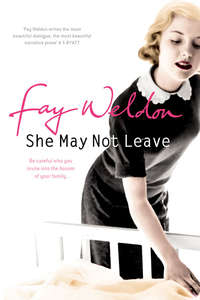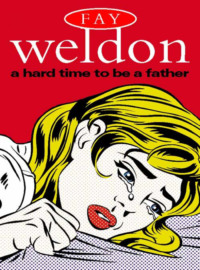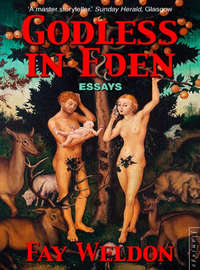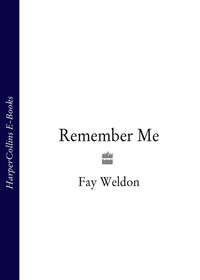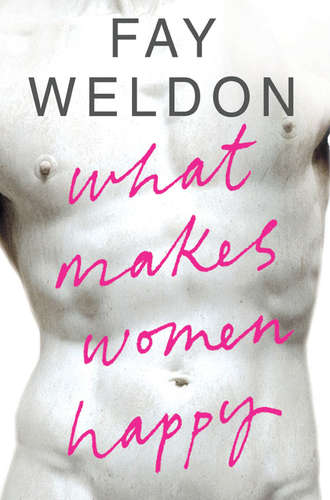
Полная версия
What Makes Women Happy
‘But we’re not going to, are we?’ he says.
‘No,’ says Letty. ‘Mara’s my friend.’
‘More to the point,’ he says, ‘David’s your partner.’
They think about this for a little while.
‘Cardiff and Cheshire,’ says Letty. ‘Too good to be true. That gives us all night.’
‘Where?’ asks Henry.
‘Here,’ says Letty.
All four have in the past had passing fantasies about what it would be like to share a bed and a life with the other – have wondered if, at the student party where they all met, Henry had paired off with Letty, David with Mara, what their lives would have been like. The fantasies have been quickly subdued in the interests of friendship and expediency. But Mara’s sheets are more expensive than Letty’s, her bed is broader. The City pays more than the NHS. Letty would love to sleep in Mara’s bed.
‘We could go to your place,’ says Henry. To elbow David out of his own bed would be very satisfactory. Henry is stronger and taller than David; Henry takes what he wants when he wants it. Henry has wit and cunning, the kind which enables you to steal another man’s woman from under his nose.
But Letty’s envy is stronger than Henry’s urge to crush his rivals. They agree to stay where they are. They agree this is greater than either of them. They share the e, looking into each other’s eyes as if they were toasting one another in some foreign land. It is in fact an aspirin, but since they both believe it’s ecstasy, it has the effect of relieving themselves of responsibility for their own actions. Who, drug-crazed, can help what they do?
They tear off each other’s clothes. Mara’s best and most seductive apricot chiffon nightie is under the pillow. Letty puts it on. Henry makes no objection. It is the one Mara wears, he has come to believe, when she means to refuse him. Too tired, too cross, just not interested. He pushes the delicate fabric up over Letty’s thighs with even more satisfaction. He doesn’t care if he tears it.
‘Shouldn’t you be wearing a condom?’ she asks.
‘I don’t like them,’ he says.
‘Neither do I,’ she says.
For ten minutes Letty is supremely happy. The dark, rich places of the flesh unfold and surround her with forgetfulness. She is queen of all places and people. She can have as many men as she wants, just snap her fingers and there they are. She has infinite power. She feels wholly beautiful, consummately desired, part of the breathing, fecund universe, at one with the Masai girl, the Manhattan bride, every flower that ever stooped to mix its pollen, every bird that sings its joy to heaven. And every one of Henry’s plunges is a delightful dagger in Mara’s heart, his every powerful thrust a reproach to pallid, cautious David.
Then Letty finds herself shifting out of a blissful present into a perplexing future. She’s worrying about the sheets. This is condom-less sex. What about stains? Will Mara notice? She could launder them – there’s a splendid washer-dryer in the utility room, but supposing it broke down mid-wash? Henry could possibly argue that he spilt wine on the sheets – as indeed he has, and honey too, now she comes to think of it. She is very sticky. Can Mara’s chiffon nightie be put in the machine or must it be hand washed?
‘Is something the matter?’ he asks.
‘No,’ she says.
But she no longer feels safe. Supposing Mara gets a call from her family on the way to Cheshire and turns back? Supposing she and Henry are discovered? Why is she doing this? Is she mad?
Her body shudders in spite of herself. She rather resents it. An orgasm crept up on her when she was trying to concentrate on important things. She decides sex is just mechanical. She’d rather have David, anyway. His penis is less effective and smaller than Henry’s, but it’s familiar and feels right. David must never find out about this. Perhaps she doesn’t want a baby as much as thought she did. In any case she can’t have a baby that isn’t David’s. What if she got pregnant now? She’d have to have an abortion, and it’s against her principles, and it would have to be secret because fathers can now claim rights to unborn embryos.
Henry rolls off her. Letty makes languid disappointment noises but she’s rather relieved. He is heavier than David.
Henry’s phone goes. He answers it. Mara is stuck behind an accident on the M6 north of Manchester,
‘Yes,’ says Henry, ‘I walked Letty home.’
Now Letty’s cross because Henry has denied her. Secrecy seems sordid. And she hates liars. And Mara? What about Mara? Mara is her friend. They’re studied together, wept together, bought clothes together and supported each other through bad times, good times. Mara and her Porsche and her new wardrobe have all seemed a bit much, true, but she sees why Mara puts Henry down from time to time. He’s not only irritating but untrustworthy. How could you trust your life to such a man? She ought to warn Mara about that, but how can she? Poor Mara, stuck behind an ambulance in the early hours in the far north while her partner betrays her with her best friend…
Henry is licking honey off his fingertips suggestively. ‘Shall we do that again?’ he asks. ‘Light of my life.’
‘No,’ says Letty and rolls out of bed. Her bare sticky feet touch the carpet and she is saved.
Moral
Few of us can resist temptation the first
time round, and we should not blame
ourselves too much if we fail. It’s the
second time that counts. Let sin pass
lightly on and over. Persist in it and it
wears your soul away.
Letty’s sense of guilt evaporates, washed away in the knowledge of her own virtue and fondness for her friend. Guilt is to the soul as pain is to the body. It is there to keep us away from danger, from extinction.
And good Lord, think what might have happened had Letty stayed for a second round! As it was she got into her own bed just minutes before David came through the door. His father had rung from Cardiff and the jewellery had been found and the burglary hadn’t happened after all. Letty hadn’t had a bath, thinking she’d leave that until the morning, but David didn’t seem to notice. Indeed, he fell on her with unusual ardour and the condom broke and he didn’t even seem to mind.
If she’d stayed in Mara’s bed David would have come round to find Letty and at worst killed Henry – fat chance! – and at best told Mara, or if not that then he’d have been able to blackmail Letty for the rest of her life. ‘Do this or I’ll tell Mara’ – and she’d have had to do it, whatever it was: go whoring, get a further degree (not that there wasn’t some attraction in surrendering autonomy…)
But as it was it all worked out okay. Letty had her 10 minutes of sublime pleasure, felt anxious, felt guilty, and was rewarded by having her cake and eating it too. I don’t know what happened to the sheets. I daresay Henry calmed down enough to put them through the washer-dryer and get them on the bed again before Mara got back. I hope he had the sense to rinse out her nightie in the basin at hand temperature, not hot.
I do know that in the following week Henry sold the Fiesta and got a Jaguar which could outrun the Porsche any day, and he used the joint account to do it. He felt better about himself.
I allow Letty, having observed the moon, to sleep illicitly with Henry once, but not twice. It is a balancing act and she got it right.
It is doing what you should, if only in the end, and not what you want which makes others respect and like you, and to be respected and liked by others is a very good way to be happy.
Save your moral strength for what is important.
The Inevitability of Anxiety
What makes women happy? Nothing, not for more than ten minutes at a time. Anxiety, doubt and guilt break through.
‘Supposing my boyfriend comes back?’ ‘Have I left the fish out for the cat?’ ‘Should I be doing this?’
Blame nature.
It’s the hormones doing it, interfering with our happiness, not the mysterious thing called me.
Instinct rewards us by gratifying our sensual appetites. It also punishes us if we go too far.
It is when we are following the promptings of instinct, doing what nature suggests, going through the motions of procreation – however unlikely they are to succeed – even in the midst of our triumph and greatest pleasure that other warring instincts set in. ‘Clean the cave, keep the baby safe, are the food stores okay? What’s that rustling at the back of the cave? Can it be the sabre-tooth tiger? We can’t just lie here enjoying ourselves! Hasn’t he finished yet? Is the fire going out? Might a vulture swoop down to get the baby? What’s the woman in the next cave up to? Has he noticed my spare tyre? Is she a better bet than me? Will he go to her?’
While he, the man, is thinking solely about pleasure and completion, concentrating on the task in hand, our female minds are already wandering.
He: ‘Is something the matter, darling? You seem to have lost interest.’
She: ‘I just remembered I left the butter out of the fridge. Sorry. Now where were we?’
Our instincts overlap and contradict each other: the one to make babies struggles with the need to look after the ones already there; the one to compete with our friends with our need to have them at our side. It leaves us confused.
Sex with the new true love brings bliss, optimism, unguarded delight – and then: ‘Am I too fat, will he notice my varicose vein, will the baby wake, will his wife come back, should I have told him I loved him?’
With the wedding, it’s all ‘Will the flowers arrive, should I have worn this tatty veil, should I really be doing this?’
With the promotion, ‘Will my friends hate me, will my new office be okay, will my partner leave me if I earn more than him?’
The pleasure in the new baby is balanced out by the anxiety that goes with bonding. Bonding is one of the worst tricks instinct plays on us. The baby cries; the mother leaps to attention. It is a lifetime’s sentence to anxiety. It doesn’t get better with time. And it is not open to reason. Experience may tell us that the teenager late home is usually late home. But mother love is panicking: ‘He’s come off his bike. There’ll be a call from the hospital.’
The baby’s quiet – and it makes you happy and proud to have got him through to the end of the day. ‘But perhaps he’s stopped breathing?’ Wake him and see!
There are so many things to be anxious about. The baby’s not breathing. You only mascaraed one eye this morning. Sheer pleasure can trigger anxiety. When you’re nibbling caviare, or taking a taxi home loaded, or feeling spaced out at a concert, what do you think? ‘I shouldn’t be here. I am going to be punished. I shouldn’t be doing this. Something terrible is about to happen. I do not deserve to be happy.’
Well, maybe you don’t. That may be the trouble.
We are more than creatures of the cave, ruled by instinct. We are moral beings as well.
Guilt, Offshoot of Anxiety
Guilt also stands between you and enjoyment. It’s an offshoot of anxiety.
‘Shouldn’t have done this, shouldn’t have done that. Shouldn’t have had a one-night stand. Shouldn’t have eaten a bar of chocolate…’
It too is instinctive, hardwired in. It applies itself to any number of situations. When we succumb to ‘inappropriate’ sexual desire, eat the forbidden chocolate – anything that makes us feel bad – that’s when the instinctive self, determined to satisfy its appetites, is in conflict with the socialized self.
‘Ought not to endanger my relationship. Ought to lose weight.’
Feel it in its purest form when you neglect your children: ‘Three in the morning, the baby’s crying, but I’m too tired to bother.’ Baby wins: eventually you stir yourself, get out of bed and see to it. Thus Mother Nature, that unseeing, unthinking, callous creature, ensures the continuation of the race.
Whether or not you have children, the capacity to feel guilt is there. Stronger in some than in others. Certainly stronger in women than in men.
She: ‘We need to get back, darling. The babysitter’s waiting up.’
He: ‘Oh, for heaven’s sake. What do we pay her for?’
Guilt is society’s safeguard. If you don’t feel guilt at all they declare you’re a psychopath and lock you up, and quite right too.
Let me add to that – just to counter the effect of so much Darwinian reductionism, which is true enough but there are other truths as well, namely that we have a spiritual life – that guilt is the soul’s safeguard. And if the soul is safeguarded, we start from a higher level of life content than we would otherwise do. If you are good – abstain from bitchiness, doing others down, malice and complaint – people like you. If you are liked, you tend to have a good life.
Be good and you’ll be happy. Be happy and you’ll be good and go to heaven.
As a corollary, if you don’t respond to the promptings of guilt, you might very well go to hell – in other words, fall into a depression, get ill and end up with no friends.
The Value of Guilt
You could see the ‘oughts’ and ‘shoulds’ which litter our lives as a nuisance, as contrary to our own self-interest. So our partner suffers because we were unfaithful, so our mother is lonely and upset because we didn’t visit, so our children weep uncomforted. So who cares? ‘I really deserve a holiday. I deserve it because I’m me.’ Stuff and nonsense.
‘Now at last,’ says the new-style granny, abstaining from babysitting, spending the children’s inheritance, ‘I’m going to do something for myself.’
You won’t enjoy it, you know. You will feel guilty and selfish every minute of your sun-soaked, pampered holiday, and so you should.
Therapists may well try and iron the emotion of guilt out of us, and some do, seeing it as ‘negative’. By which they mean it’s uncomfortable, painful and inconvenient, and aren’t we trying to achieve happiness here? ‘Look to your own skin,’ they advise. ‘Do what you want.’
Alexander Crowley, black magician, rapist and philosopher of Edwardian times, self-styled Beast no. 666, had this as his philosophy: Do what thou wilt shall be the whole of the Law. It was an attitude seen as very shocking at the time, even satanic. If it doesn’t sound all that unreasonable now it may be our loss as, seeking validation for our bad actions, we virtuously pursue the ‘authenticity of our feelings’ (‘I have to leave you and the kids because I’m in love’) and decide we deserve every good thing, in the words of the shampoo ad, because we’re worth it.
Self-esteem can go too far – a little low self-esteem might not come amiss as we consider our faults and failures. On our deathbeds the memory of the authenticity of our feelings might not seem as important as the love and company of our friends and relatives.
There is a truly simple answer to the pains of guilt: If you feel bad about it, don’t do it.
Now there’s an old-fashioned doctrine. Step by step, little by little, do what you should, not what you want.
Conscience is to the soul as pain is to the body. It keeps you out of harm’s way.
Doing Bad and Feeling Worse
There are little everyday acts of meanness, little evils which are under our control, little tactlessnesses meant to hurt, which contribute to our own unhappiness. For hidden somewhere within us is the fear of retaliation. ‘If I do this, you might do that.’ You get wary and untrusting. Meanness shows – it’s bad for the complexion, gives you a dull skin, wrinkles and squinty eyes. You end up, in fact, with the face you deserve.
And then there are the great big destructive acts, like bringing your family toppling down like a house of cards. It’s quite easy to do and you will always find allies.
Daughter: ‘You were a terrible mother. That’s why I’m such a mess. My therapist says so. I hate you. I’m not letting you see your grandchildren any more – you’re such a monster you might do the same to them as you did to me.’
Mother: ‘But I did the best I could. You are the meaning of my life. I love you the way you love your own children.’
Daughter: ‘Daddy, you must have abused me when I was a little girl. My therapist says there’s no other explanation for my feelings of hostility and depression.’
Father: ‘Perhaps you were just born that way. Perhaps you should go to church and not a therapist. Meanwhile, thanks a million for breaking up the family. I’m off.’
One day you come to your senses and wonder what it was all about, and you can remember everything, but there’s no one to tell, no family shoulders left to cry on, and your own children don’t seem to seek your company.
Conclusion
There are some truly bad therapists out
there as well as some very good ones.
Proud, Defiant and Unhappy
You can take the proud and defiant path through life, of course. Some do and get away with it. You can decide you have problems because you let yourself be trampled on and go to assertiveness classes.
It has never seemed to me, however, that assertiveness classes have done anyone any good. My friend Valerie went to one, complaining that other people walked all over her. My own feeling was that she was the one who normally did the trampling, while worrying about her self-esteem and tendency to self-effacement. When she returned after her two-week course she bullied more, smiled less and her self-esteem was sky-high. It’s true she got a rise, but she lost her boyfriend. Justice was on her side, but life wasn’t.
The fewer the mini-nastinesses we do – and we all do them – the better able we will be to deal with the real, great, imponderable areas of unhappiness when they come along. Which they do, unasked, in everyone’s life.
Moral
If you haven’t anything nice to say, don’t
say anything at all. Smile though you want
to spit. When in doubt, do nothing.
This flies in the face of contemporary wisdom, I know. Valerie was told to give voice to her anger (or she’d get cancer), speak emotional truths (it was only fair to herself), claim the authenticity of her feelings (‘I feel, therefore I’m right’) never fake orgasm (it’s a lie, an indignity) and in general claim her rights and seek justice in the home and at work. Above all she must never be persuaded into making the office coffee, because she was worth more than that.
Valerie sounded off at her boss when he said it would be nice to have a cup of coffee, and he said that was the last straw, he was tired of being bullied, and he fired her. She told her mother she’d rather she didn’t phone the office because of her Birmingham accent and her mother spent her savings – those that hadn’t gone on Valerie’s expensive education – on a little cottage in France and wouldn’t be there to babysit when she was needed – not that there was much question of babies any more, since Valerie was 41 and her boyfriend got so nervous in the end about not ‘giving’ her an orgasm (which didn’t seem in his power to give anyway) that the sex dried up altogether and he left. And she had to make her own coffee in her lonely home, while trying to find a lawyer willing to accept her unfair dismissal case, and these days caffeine gave her palpitations, and her mother was out of even mobile range.
An Alternative Therapy: Prayer
Suffer a pang of remorse when in bed with your best friend’s boyfriend and act upon it by getting out of the bed, and you will have less sensual pleasure in the short term, but it is amazing how gratifying doing the right thing is. Your best friend may not see it quite like that, of course, concentrating only on the fact that you were in the bed in the first place.
But pray God she will never find out.
I mean that. Actually pray. Gather a few forces around you. The way to be happy, to forestall anxiety and guilt, is to be good.
The world being what it is, you may not know what praying is. (Look it up on the Internet and you can’t find a definition.) But this is how it goes. You sit down. You create a mental space around you. Shutting your eyes helps. Hands steepled together helps: you’re enclosing yourself within yourself, making a separation between yourself and what’s outside you. Which, you will find, if you develop the antennae, is a kind of breathing presence, the majesty of existence itself. You are part of it.
Pray for others, not yourself. (Praying for yourself is vulgar.) Hold your friends in your mind, household by household. Direct your thoughts towards them, wish them well, enfold them and surround them with goodwill. Family too, of course, but anxieties and practicalities are more likely to break through here. Attention wanders.
You can link what you’re doing with a known religion, the Father (‘Dear Holy Father’), the Son (‘Dear Lord Jesus’) or Holy Ghost (though very few pray to him because he is so hard to envisage), or any of the saints (‘Dear St Anthony, help me find my lost sentence’), or Pan, I suppose, if you’re a pantheist (‘Dear Lord Pan, help me find my lost virility’), or Mother Mary (‘Help me get pregnant’), but with all these what you are doing is using an intermediary to connect you. Prayer is easier than meditation, which encourages self-centredness and too great a sense of ‘Look at me, meditating!’ You seldom fall asleep when praying for others, as you do when meditating. You just stop when concentration fails.
Perfection is impossible to achieve, of course. But we can try, and angels will attend us, and we can take pleasure from the gentle air of their beating wings.
A Joke: Man Prays to God
‘Dear God, let me win the lottery!’ The voice is piercing, shrill and desperate, amongst all the others pleading to God for help. It goes on for week after week, Wednesday after Saturday after Wednesday: ‘Let me win the lottery!’
The Almighty does his best to ignore the voice, but finally he can’t stand it any more. He speaks like thunder from the clouds. ‘Okay,’ says God, ‘tell you what, I’ll meet you halfway. Buy a ticket.’
The Major Enemies of Happiness
Forget guilt, forget anxiety. There are real enemies of happiness out there, real tribulations, which are powerful and not self-inflicted. Things that just happen.
Difficulties Along the Way
Old age
Illness
Bereavement
Isolation
Debt
Bitterness
Old Age
Make no mistake about it, money helps. It makes most troubles easier, while not necessarily solving problems.
Failing money, friends help – as does a long record of good behaviour and kindness to others. The comfort of strangers, if sought, is often there. What you put into life at the beginning you can take out with dividends at the end.
Old age seen from the outside can look horrific. But if you’re in there in that derelict body it’s still you; there are still pleasures and ambitions left to you. You are Ivan in the Russian story by Solzhenitsyn, the man in the prison camp who guarded his piece of dry bread successfully all day, and when he finally ate it, enjoyed incomparable pleasure. Seen from the outside, it was dreadful; from the inside, triumphant. May it be like that for you.


